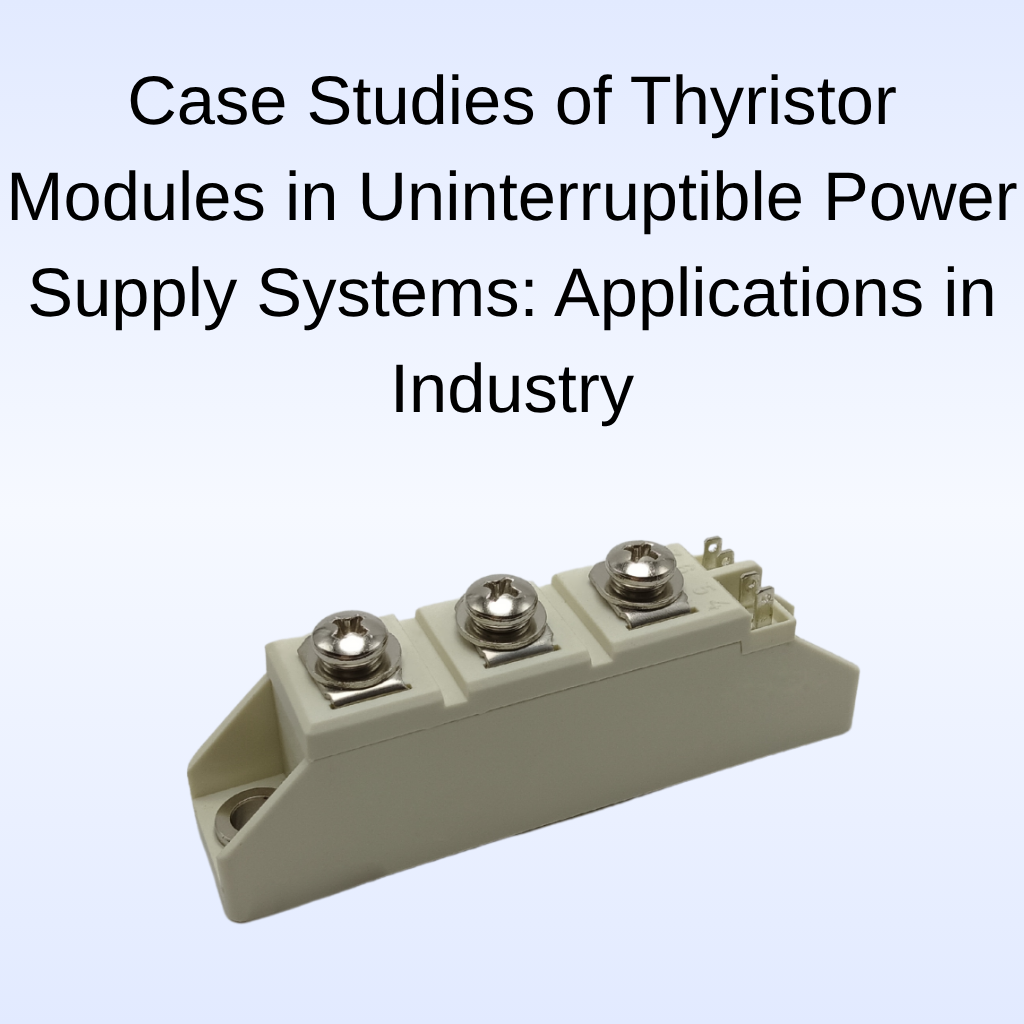Case Studies of Thyristor Modules in Uninterruptible Power Supply Systems: Applications in Industry
Thyristor modules are crucial components in Uninterruptible Power Supply (UPS) systems, ensuring that sensitive equipment remains protected and powered during power interruptions. The performance of UPS systems can be significantly enhanced by using specialized thyristor modules that offer superior features such as high surge current tolerance, low on-state voltage, and industrial phase control. In this article, we present several real-world case studies where thyristor modules have been successfully implemented in UPS systems across various industries.
Case Study 1: Managing High Surge Current in a Data Center
A large data center faced frequent issues with power fluctuations that affected its ability to provide constant service to clients. The data center upgraded its UPS system by integrating thyristor modules designed to handle high surge current and ensure the stability of the power supply. With the use of dual thyristor modules, the system was able to manage the sudden power surges during peak load periods. The integration of low on-state voltage further enhanced energy efficiency, minimizing unnecessary power losses and extending the lifespan of the UPS system. The system’s ability to provide continuous, stable power improved the data center's uptime, resulting in enhanced service reliability.
Case Study 2: Smart Grid Compatibility in a Manufacturing Plant
A manufacturing plant required a power backup solution that could integrate seamlessly with a smart grid to ensure continuous operation even during power outages. Thyristor modules with smart grid compatibility were incorporated into the UPS system. These modules allowed the UPS to communicate with the smart grid, optimizing energy usage and ensuring that critical equipment received uninterrupted power. The system’s ability to handle high surge current ensured that it could withstand power spikes, while industrial phase control helped maintain consistent voltage levels. By adopting this solution, the manufacturing plant reduced energy waste, optimized its power distribution, and improved the overall efficiency of its operations.
Case Study 3: Temperature Control in Sensitive Medical Equipment
A healthcare facility that relied on life-support systems and diagnostic equipment needed a UPS system capable of maintaining consistent power while preventing overheating. Thyristor modules with temperature control were selected for their ability to maintain the system's operating temperature and prevent overheating of critical components. The integration of dual thyristor modules also ensured redundancy and enhanced system reliability. Furthermore, low on-state voltage helped minimize energy loss, ensuring that the UPS system operated with maximum efficiency. With these features, the healthcare facility ensured that its vital medical equipment continued to operate smoothly without any interruptions during power outages.
Case Study 4: Power Factor Correction in an Industrial Plant
In an industrial plant, power factor issues were causing inefficient energy consumption and higher operational costs. To address this, the plant upgraded its UPS system with thyristor modules equipped with HVDC power factor correction. These modules helped correct the power factor, optimizing energy use and reducing losses. The industrial phase control feature allowed the UPS system to deliver stable and reliable power, even during periods of high demand. By incorporating dual thyristor modules, the plant improved both the performance and the longevity of the system, ensuring uninterrupted operation of critical machinery.
Case Study 5: Soft-Start Battery Charger in a Telecom Facility
A telecom facility required a UPS system capable of handling frequent power surges and maintaining system stability. The solution was to incorporate thyristor modules with soft-start battery chargers that gradually increased the load during startup, avoiding the typical stress caused by sudden power surges. These dual thyristor modules not only provided the necessary surge protection but also minimized high surge current risks, ensuring a reliable power supply. The low on-state voltage feature enhanced the overall energy efficiency of the system, providing significant cost savings over time.
Conclusion
The use of advanced thyristor modules in UPS systems has proven to be highly beneficial across various industries, from data centers to manufacturing plants and healthcare facilities. Features like high surge current handling, low on-state voltage, industrial phase control, and dual thyristor modules enhance the reliability, efficiency, and longevity of these systems. As demonstrated by these case studies, selecting the right thyristor modules for specific applications ensures that critical equipment remains operational, even during power disruptions.
READ MORE:
Installation and Maintenance Guide for Thyristor Modules in UPS Systems: Optimizing Performance
Installation and Maintenance Guide for Thyristor Modules in UPS Systems
Case Studies of Thyristor Modules Used in Uninterruptible Power Supply Systems
Best Practices for Selecting Thyristor Modules in UPS Systems

